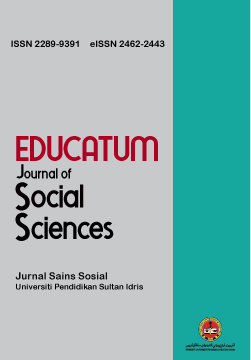Personal growth initiative in relation to life satisfaction among university students
Inisiatif pertumbuhan personal dan perkaitannya dengan kepuasan hidup dalam kalangan pelajar universiti
DOI:
https://doi.org/10.37134/ejoss.vol6.2.5.2020Keywords:
Personal Growth Initiative, Life Satisfaction, University StudentsAbstract
This study aimed to examine the relationship between personal growth initiative constructs which are planfulness, using resources, readiness to changes, and intentional behaviour on satisfaction with life. This study involved respondents comprising of 225 first-year university students. The data were gathered from a set of adapted questionnaire, namely Personal Growth Initiative Scale-II (PGIS-II) to measure university students’ intentional process of personal growth and Satisfaction with Life Scale (SWLS) to measure their life satisfaction. Results showed that there were significant correlations among all four-construct of personal growth initiative and life satisfaction. The personal growth initiative was a significant predictor of which contributed 17.2% variance toward university students’ life satisfaction. The findings give implication that university students with planfulness, using resources, readiness to changes, and intentional behaviour were more likely to experience satisfaction with their life. These elements of intentional growth of university students enable them to guide themselves toward completing their academic life with satisfaction. It is hoped that this study enlightens an understanding on the relationship between personal growth initiative and life satisfaction in the contex of higher educational academic setting in Malaysia.
Downloads
References
Appleton, S. & Song, L. (2008). Life satisfaction in urben China: Components and determinants. World Development, 36, 2325-2340.
Bauer, J. J., Park, S. W., Montoya, R. M., & Wayment, H. A. (2014). Growth motivation toward two paths of eudemonic self-developemnt. Journal of Happiness Studies. 16, 185-210.
Buyukgoze, H. (2005). An investigation of pre-service science and mathematics teachers’ personal growth initiative. Acta Didacta Napocensia, 8, 47-53.
Cakir, V. O. & Demirel, D. H. (2019) A student-oriented study: Analyzing the relationship between happiness and satisfaction with life. Journal of Educational Studies, 5, 150-161.
Diener, E., Emmons, R. A., Larsen, R. J., & Griffin, S. (1985). The satisfaction with life scale. Journal of Personality Assessment, 49, 71-75.
Diener, E., Suh, E. M., Lucas, R. E., & Smith, H. L. (1999). Subjective well-being: Three decades of progress. Psychological Bulletin, 2, 276-302.
Dordi M., & Purandare, M. (2018). Life satisfaction, personal growth initiative and hope in alcoholics: A correlation study. Inidian Journal of Positive Psychology, 9, 427-431.
Dost, M. T. (2007). An examination of subjective well-being and life satisfaction of students attending to universities in South Africa and Turkey. Egitim ve Bilim, 35, 75-89.
Extremera, N, Duran, A., & Rey, L. (2009). The moderating effect of trait meta-mood and perceived stress on life satisfaction. Personality and Individual Differences, 47, 116-121.
Faul, F., Erfelder, E., Buchner, A., & Lang, A. (2009). Statistical power analyses using G*Power 3.1: Test for correlation and regression analyses. Behavior Research Method, 41, 1149-1160.
Gilman, R. & Huebner, E. S. (2006). Characteristics of adolescents who report very high life satisfaction. Journal of Youth and Adolescence, 35, 293-301.
Grant, N, Wardle, J., & Steptoe, A. (2009). The relationship between life satisfaction and health behavior: A cross-cultural analysis of young adults. International Journal of Behavioral Medicine, 16, 259-268.
Gundogar, D., Gul, S. S., Uskun, E., Demirci, S., & Kececi, D. (2007). Invesatigation of the predictors of life satisfaction in university students. Clinical Psychiatry, 10-14-27.
Hardin, E.E., Weigold, I.K., Robistchek, C. (2007). Self-discrepancy and distress: The role of personal growth initiative. Journal of Counseling Psychology, 54, 86-92.
Ilhan, N., Guzluk, M., & Ozmen, E. (2019). The relationship between mental health and basic need fulfillment of university students. Journal of Psychiatric Nursing, 4, 265-274.
Kapikiran, N. A. (2012). Positive and negative affectivity as mediator and moderator of the relationship between optimism and life satisfaction in Turkish university students. Social Indicators Research, 106, 333-345.
Malik, N. I., Yasin, G., & Shahzadi, H. (2013). Personal growth initiative and self-esteem as predictors of academic achievement among students of technical training institues. Pakistan Journal of Social Science, 33, 435-446.
Negovan, V. (2010). Dimensions of students’ psychological well-being and their measurement: Validation of a students’ psychosocial well-being inventory. Europe’s Journal of Psychology, 2, 85-104.
Rapheal, J., & Vargese, P. K. (2014). Self-actualization and personal growth initiative among the teachers of adolescents. Academic Journal of Psychological Studies, 3, 432-441.
Robitschek, C. (1998). Further validation of the personal growth initiative scale. Measurement and Evaluation in Counseling and Development, 30, 183-198.
Robitschek, C. (1999). Further validation of the personal growth initiative scale. Measurement and Evaluation in Counseling and Development, 31, 197-210.
Robitschek, C. (2003). Validity of personal growth initiative scales score with a Mexican American college student population. Journal of Counseling Psychology, 50, 496-502.
Robitschek, C. & Kashubeck, S. (1999). Structural model of parental alcoholism, family functioning, and psychological health: The mediating effects of hardiness and personal growth orientation. Journal of Counseling and Psychology, 46, 159-172.
Robitschek, C., & Keyes, C. L. M. (2009). Keye’s model of mental health with personal groth initiative as a parsimonious predictot. Journal of Counseling Psychology, 56, 321-329.
Spatz, C. & Kardas, E. (2008). Research methods in psychology. New York, NY: McGraw-Hill.





